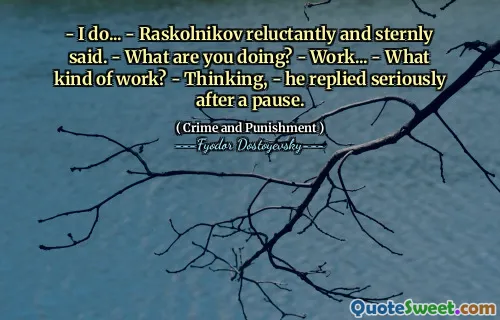"Crime and Punishment," a novel by Fyodor Dostoevsky, follows the story of Rodion Raskolnikov, a former student living in poverty in St. Petersburg. Raskolnikov grapples with a philosophical belief that extraordinary individuals have the right to commit crimes if it serves a greater purpose. This idea leads him to murder a pawnbroker, which ignites a deep internal struggle and moral confusion. As he attempts to rationalize his actions, he becomes increasingly disturbed, haunted by guilt and paranoia.
The novel explores themes of morality, redemption, and the psychology of crime. Raskolnikov's interactions with various characters, including the compassionate Sonia and the relentless investigator Porfiry, highlight the moral dilemmas he faces. Through these relationships, Dostoevsky delves into the conflicts between good and evil, illustrating how Raskolnikov's intellectual theories clash with the emotional repercussions of his crime.
Ultimately, "Crime and Punishment" is not just a tale of murder, but a profound examination of the human condition. It asks important questions about justice, suffering, and the possibility of redemption. Raskolnikov's journey from isolation to connection and his eventual acceptance of guilt showcase Dostoevsky's belief in the potential for personal transformation through suffering and love. The novel remains a powerful exploration of the search for meaning in a chaotic world.
More »
Today Birthdays
1729 -
Edmund Burke
1949 -
Haruki Murakami
1954 -
Howard Stern
1876 -
Jack London
1993 -
Zayn Malik
1951 -
Kirstie Alley
1863 -
Swami Vivekananda
1923 -
Alice Miller
1987 -
Naya Rivera
1825 -
Brooke Foss Westcott
1944 -
Joe Frazier
1951 -
Rush Limbaugh
1964 -
Jeff Bezos
1978 -
Jeremy Camp
1628 -
Charles Perrault
1856 -
John Singer Sargent
1970 -
Kaja Foglio
1953 -
Rick Santelli
1986 -
Gemma Arterton
1968 -
Raf Simons
1958 -
Christiane Amanpour
1966 -
Olivier Martinez
1996 -
Ella Henderson
1917 -
Maharishi Mahesh Yogi
1949 -
Ottmar Hitzfeld
1928 -
Ruth Brown
1968 -
Heather Mills
1946 -
George Duke
1968 -
Rachael Harris
1923 -
Ira Hayes


